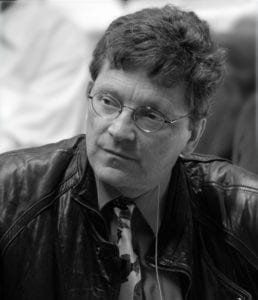Poetry Can Save Your Life
I started out as a fiction writer, a storyteller, a mimic. A derivative time travel piece for our middle school literary magazine was rejected and it took me eons to get back in the saddle. By freshman year of college, a quasi-Hemingway hunting story was brewing. By junior year, I was writing song lyrics to go with my bad guitar-hack noise. A poet friend told me my lyrics sucked but might possibly turn into some decent poems. Poems? What the hell?
But everybody seemed to hate my mostly autobiographical stories (particularly my girlfriends) so I gave it a try. And soon my poetry was getting easy laughs. I followed that road for years. The big difference was that I left myself out of the poems. I mean, sure they were rooted in some personal truth — a place, a person, a perception or trigger — but they sped off in uncharted directions pretty quickly. I’ve always taken normal and bent it as far into the absurd as I can while riffing on the universal. And I had fun deploying personae and pure fiction in my poems as well.
And then wham, my father died of a massive heart attack in 1988. We had a hate-love relationship. I wrote a lot of poems that wound up in my book Sad Fashions about us, and families, and my particular family.
“The Forgiveness Device” altered the audience perception of both me and my work. Older poets took me aside and wanted to know what was going on. My emotions were raw and real. I often teared up reading the poem aloud.
I realize I’m throwing my father under the bus, allowing myself to cling to the idea that I’d forgive him. At least by the end of the poem. How magnanimous of me. I was grappling with a ton of rage. It took me more than a decade to get over his death, despite us not being very close. Not at all. Alcohol, verbal and physical abuse, politics, racism, and the Vietnam war drove a permanent wedge between us that no amount of family history could fix. And yet, here I am three years older than he was when he died. I think I have more sympathy for him these days. But who knows?
So, see what you think. One of my first autobiographical poems.
The Forgiveness Device
“Hold that flashlight still.”
But I can’t. It’s impossible.
I’m only a child and I watch
as he puffs up bigger and bigger
—like a barrage balloon—
pushing back his glasses
that are smeared with grease
as he winds the clicking
ratchet again and again
changing sparkplugs in the dark.
The garage light won’t reach outside
to where we stand around the
burgundy Chrysler. I’m scared.
Snot dripping down my face. Tears.
The fender is too big for me
to lean over, but I try
and my arm is so numb
it tingles. The drop light
flickers against the hood.
My father is stripping skin
off his knuckles as the ratchet
slips and dings off the manifold.
He’s talking to himself.
Saying he can’t see and
beginning to cuss.
I realize now—
that he’s angry at himself,
at his failure to fix
something so elementary
and his anger
is misdirected at me.
But back then I was just
a bookish little kid
afraid of failing.
I didn’t know yet that
it’s okay to fail.
That my father was
just trying to save a buck
and afraid of aging.
The price was high.
Why can’t you wait till morning?
I wanted to say, but didn’t dare.
He drinks another Ballantine,
crumples the can and drops
it on the driveway.
If I could
I’d materialize at that exact moment
the aluminum still rattling
against the concrete.
Tell him, “It’s not that important Dad.
It’s just a couple of sparkplugs.
Don’t get so stressed.”
I’d rub my red bandanna
across his forehead
and soothe his brow.
Tell him, “Relax.”
And watch his features soften.
Hear that laughter again.
And I’d forgive him.
I really would.
 Richard Peabody is the author of a novella, three short story collections, and seven poetry books. He is a native Washingtonian and has taught fiction writing at Johns Hopkins University, where he received the Faculty Awards for Distinguished Professional Achievement and Teaching Excellence. He is also the Beyond the Margins Above and Beyond 2013 Award winner for his outstanding service to the Washington, D.C. literary community, and he is Eckleburg‘s Patron Saint of Indie. He is the founder and co-editor of Gargoyle Magazine and editor of twenty-one anthologies including Mondo Barbie. His collection of short stories, Blue Suburban Skies, is out from Main Street Rag Press. Read “Maraschino Cherries,” an excerpt from his collection, Speed Enforced by Aircraft (The Broadkill River Press, 2012). His Newest book is The Richard Peabody Reader is a compendium of the author’s best poems, stories, and drama available from ASP.
Richard Peabody is the author of a novella, three short story collections, and seven poetry books. He is a native Washingtonian and has taught fiction writing at Johns Hopkins University, where he received the Faculty Awards for Distinguished Professional Achievement and Teaching Excellence. He is also the Beyond the Margins Above and Beyond 2013 Award winner for his outstanding service to the Washington, D.C. literary community, and he is Eckleburg‘s Patron Saint of Indie. He is the founder and co-editor of Gargoyle Magazine and editor of twenty-one anthologies including Mondo Barbie. His collection of short stories, Blue Suburban Skies, is out from Main Street Rag Press. Read “Maraschino Cherries,” an excerpt from his collection, Speed Enforced by Aircraft (The Broadkill River Press, 2012). His Newest book is The Richard Peabody Reader is a compendium of the author’s best poems, stories, and drama available from ASP.